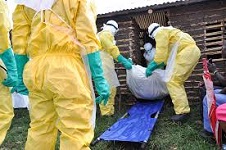The rising death toll from Ebola virus in Western Uganda is fueling fears in the East Africa region, as authorities and aid agencies rally efforts to contain the deadly virus.
At least 10 deaths, 44 confirmed and 20 probable cases have so far been reported. The International Rescue Committee (IRC) has launched a response with the Ministry of Health to raise awareness of the outbreak especially amongst frontline health staff as well as activities to strengthen existing IRC supported health centers in readiness for a potentially widespread outbreak.
“We are concerned about the impact the spread of the virus could have and therefore have teamed up with health authorities to boost awareness, especially to frontline workers who are more exposed to the virus, as well as improving health facility readiness and linking community responders to the currently running IRC health programs,” said Elijah Okeyo, IRC Uganda Country Director.
It is imperative we apply the lessons learned from past outbreaks to stop the spread of Ebola in Uganda and beyond its borders. The IRC stands in solidarity with the affected communities and is calling for immediate action and funding for frontline aid agencies to contain the outbreak and prevent further spread.
The IRC has extensive experience in Ebola virus infection prevention and control activities. IRC responded to the 2019 outbreak in Uganda as well as several outbreaks since 2018 in the Democratic Republic of Congo. The IRC works on women’s and children’s protection, and integrating Ebola-related protection concerns in areas where the IRC supports primary health care services. The IRC also worked to contain the 2014-2016 West Africa outbreak in Liberia and Sierra Leone.
The IRC began programming in 1998 in northern Uganda in response to mass displacement wrought by the Lord’s Resistance Army. Since then, the IRC has expanded to provide critical services for refugees and vulnerable Ugandans throughout the country.
The IRC started supporting refugees and vulnerable individuals in Kampala in 2012, and was one of the first organizations to respond in 2016 at the onset of the South Sudanese refugee crisis. As of 2019, the IRC entered Tooro to support refugees while also providing epidemic preparedness and response services throughout the region.
In addition to emergency support, the IRC also invests in long-term stability for refugees and Ugandans through programs like immunization, family planning, legal services, women’s empowerment, education, and livelihoods. More recently, IRC has been involved in supporting Afghan evacuees in Uganda.
The International Rescue Committee responds to the world’s worst humanitarian crises, helping to restore health, safety, education, economic wellbeing, and power to people devastated by conflict and disaster. Founded in 1933 at the call of Albert Einstein, the IRC works in more than 40 countries and in 28 U.S. cities helping people to survive, reclaim control of their future, and strengthen their communities.

